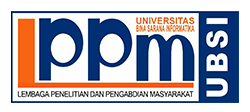DESAIN PERENCANAAN STRATEGI PENGEMBANGAN POTENSI WISATA KULINER DAN BELANJA KOTA BANDUNG
Sari
ABSTRAK
Kota Bandung merupakan kota Metropolitan terbesar di Jawa Barat dan juga merupakan ibu kota provinsi, serta pernah menjadi tempat terlaksananya Konferensi Asia Afrika 1955. Kota Bandung dengan segala potensi sumber daya yang dimilikinya dikenal akan wisata alam dan budayanya. Namun dengan perkembangan yang ada beberapa tahun terakhir ini, Bandung mulai dikenal juga melalui potensi wisata kuliner dan belanja yang dimilikinya. Bahkan Kementrian Pariwisata telah menetapkan Bandung sebagai salah satu destinasi unggulan wisata kuliner dan belanja di Indonesia. Namun demikian, masih ada beberapa masalah yang dihadapi seperti belum terintegrasinya kawasan-kawasan wisata belanja dan kuliner yang menyebabkan pengembangan belum optimal, kurangnya ketersediaan fasilitas transportasi, lahan parkir, dukungan promosi dan kerjasama antar pemangku kepentingan. Penelitian ini berupaya untuk mengidentifikasi potensi dan tantangan wisata kuliner dan wisata belanja dengan menggunakan metoda kualitatif deskriptif. Pengumpulan data akan dilakukan melalui focus group discussion terhadap stakeholder pariwisata di Kota Bandung. Hasil dari penelitian ini adalah penyusunan strategi pengembangan wisata kuliner dan belanja kota Bandung.
Kata Kunci : destinasi, perencanaan strategi, wisata kuliner dan belanja
ABSTRACT
Bandung is the largest Metropolitan city in West Java and is also the capital of the province, and was the venue for the 1955 Asian-African Conference. The city of Bandung with all its potential resources is known for its natural and cultural tourism. However, with the developments that have occurred in the last few years, Bandung has also begun to be recognized by its culinary and shopping potential. Even the Ministry of Tourism has designated Bandung as one of the leading destinations for culinary tourism and shopping in Indonesia. However, there are still a number of problems faced, such as not yet integrated shopping and culinary tourism areas which have resulted in not optimal development, lack of availability of transportation facilities, parking lots, promotional support and cooperation between stakeholders. This study seeks to identify the potential and challenges of culinary tourism and shopping tourism by using a qualitative descriptive method. Data collection will be carried out through focus group discussions on tourism stakeholders in the city of Bandung. The results of this study are the formulation of a strategy for the development of culinary tourism and shopping in the city of Bandung.
Keywords: culinary and shopping tourism, destination, strategic planning
Teks Lengkap:
PDFReferensi
Creswell, J. W. (2013). Research Design: Qualitative, Quantitative, and Mixed Methods Approaches (4th ed.). In Research design Qualitative quantitative and mixed methods approaches. https://doi.org/10.1007/s13398-014-0173-7.2
Goeldner, C. R. dan Ritchie, J. R. (2012). Tourism – principles, practices, philosophies.
Jansen, V. (1991). Leisure shopping : a major concept for the tourism industry ? Journal of Tourism Management.Diakses Dari Emerald Publishing Limited., 12(1).
Komaladewi, R. (2017). The Representation of Culinary Experience as the Future of Indonesian Tourism Cases in Bandung City, West Java. International Journal of Business and Economic Affairs, 2(5). https://doi.org/10.24088/ijbea-2017-25001
Leiper, N. (1990). Tourism Systems. Department of Management Systems Occasional Paper 2.
Meng, F. dan Xu, Y. (2012). Tourism shopping behaviour : planned, impulsive, or experiential ? International Journal of Culture, Tourism and Hospitality Research, 6(3).
Okumus, F., Kock, G., Scantlebury, M. (2013). Using local cuisines when promoting small Caribbean island destinations. Journal of Travel and Tourism Marketing.Diakses Dari Emerald Publishing Limited, 30(4).
Pestek, A., & Cinjarevic, M. (2014). Tourist perceived image of local cuisine: The case of Bosnian food culture. British Food Journal, 116(11), 1821–1838.
Sotiriades, M. (2012). Tourism destination marketing : approaches improving effectiveness and eficiency. Journal of Tourism and Hospitality Technology, 3(2).
Swarbrooke, J. (2002). The development and management of visitor attractions, 2nd ed.
Vogel, H. L. (2016). Tourism.
Walker, J. R. (2010). Tourism : concepts and practices. Prentice Hall ; Pearson Education [distributor].
Weaver dan Lawton. (2014). Tourism Management, 5th ed.
DOI: https://doi.org/10.31294/par.v8i1.9205










